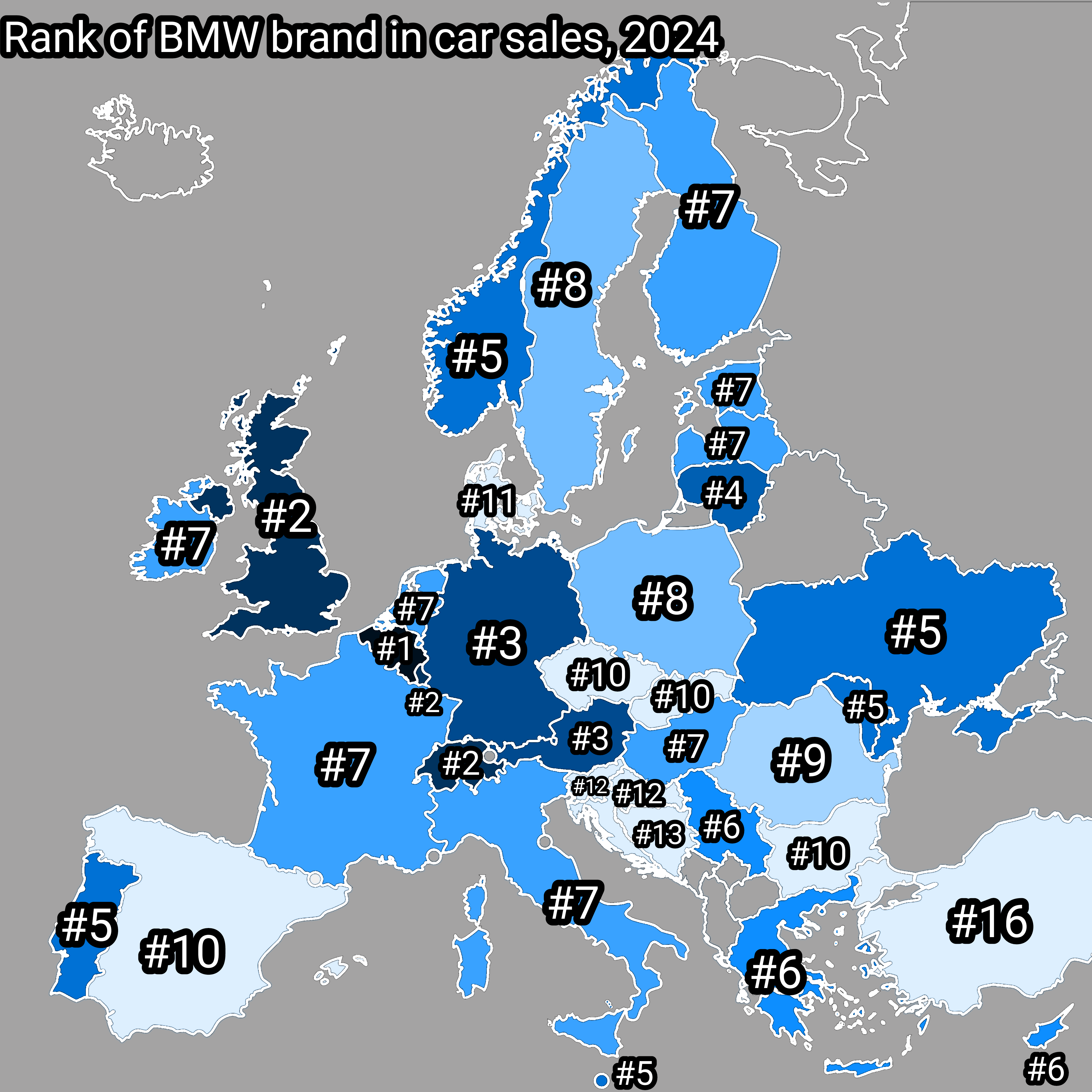BMW Car Sales Rank in Europe Map 2024


Marcus Rodriguez
Historical Geography Expert
Marcus Rodriguez specializes in historical cartography and geographic data analysis. With a background in both history and geography, he brings unique...
Geographic Analysis
What This Map Shows
The visualization titled "Rank of BMW, the brand, in car sales, in Europe, 2024" provides a clear and informative look at how BMW stands in comparison to other automotive brands across various European countries. This map highlights BMW's sales performance, allowing viewers to easily identify which regions are strongholds for the brand and where it might be struggling. As we delve deeper into the topic of car sales in Europe, it’s essential to understand the broader market dynamics that influence these rankings.
Deep Dive into Car Sales in Europe
Car sales in Europe are influenced by a multitude of factors, from economic conditions and consumer preferences to environmental regulations and technological advancements. Interestingly, Europe has one of the most competitive automotive markets in the world, where established brands like BMW, Volkswagen, and Mercedes-Benz vie for market share alongside newer electric vehicle manufacturers.
As of 2024, BMW continues to maintain a significant presence in the premium automobile segment. The brand is recognized for its commitment to innovation, quality, and driving experience, which resonates well with European consumers. In recent years, BMW has also focused on diversifying its portfolio to include electric and hybrid models, aligning with the growing demand for more sustainable transportation options. In fact, the European car market has seen a notable shift towards electrification, with electric vehicle (EV) sales increasing significantly. Questions arise: How does this shift impact traditional luxury brands like BMW? Have they effectively adapted to the changing landscape?
In 2024, the trends show that BMW has successfully positioned itself as a frontrunner in the electric vehicle market, with models like the BMW i4 and the iX attracting attention. However, competition remains fierce. Tesla, for instance, has made substantial inroads in Europe, appealing to environmentally conscious consumers looking for cutting-edge technology. The struggle for dominance between these brands highlights the evolving preferences of European buyers.
Moreover, economic factors such as inflation rates and consumer confidence play a pivotal role in car purchasing decisions. In countries like Germany and France, where economic stability is relatively robust, BMW often ranks higher in sales. Conversely, in regions experiencing economic turbulence, luxury brands may see a decline in demand. This correlation between economic health and car sales is critical for understanding regional differences within the map. As the landscape shifts, so too do the rankings of car brands across Europe.
Regional Analysis
Examining the map reveals distinct regional variations in BMW's car sales rankings. For instance, in Germany, BMW consistently ranks as one of the top-selling brands, bolstered by a strong domestic market and brand loyalty. In this country, the automotive industry is a crucial component of the economy, and consumers tend to favor local manufacturers. Interestingly, BMW’s home advantage is reflected in its extensive network of dealerships and service centers, which enhances customer trust and accessibility.
In contrast, looking at Southern Europe, countries like Italy and Spain show a different picture. While BMW has a presence, it faces stiff competition from brands such as Fiat and Renault, which dominate the market due to affordability and local manufacturing. Despite this, BMW’s commitment to luxury and performance keeps it relevant, particularly among affluent consumers.
Moving towards Northern Europe, nations like Norway and Sweden exhibit a growing preference for electric vehicles, where BMW has been making strategic investments. The popularity of EVs in these countries has allowed BMW to gain traction, especially with its electric offerings. This regional analysis not only highlights the importance of local market dynamics but also how consumer preferences can vary dramatically across Europe.
Significance and Impact
Understanding BMW’s rank in car sales across Europe is more than just a matter of statistics; it has significant implications for the automotive industry and the economy at large. The performance of automotive brands can influence employment rates, manufacturing decisions, and even environmental policies. A strong showing from BMW could lead to increased investments in local manufacturing, while a decline might prompt a reevaluation of strategies.
Moreover, as the automotive landscape continues to evolve with the shift towards electric vehicles, the implications of these sales rankings will only grow. Policymakers and industry leaders must pay attention to these trends, as they could shape future regulations and incentives aimed at promoting sustainability in transportation. As consumers become more environmentally conscious, the rankings of brands like BMW will likely reflect broader societal shifts towards sustainability.
In conclusion, the map detailing BMW's rank in car sales across Europe in 2024 serves as a vital tool for understanding the dynamics of the automotive market. It highlights the intricate relationship between consumer preferences, economic conditions, and environmental considerations, all of which play a crucial role in shaping the future of car sales in Europe. As we look ahead, keeping an eye on these trends will be essential for both consumers and industry stakeholders alike.
Visualization Details
- Published
- September 8, 2025
- Views
- 86
Comments
Loading comments...